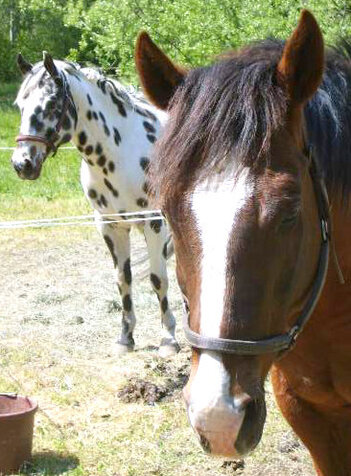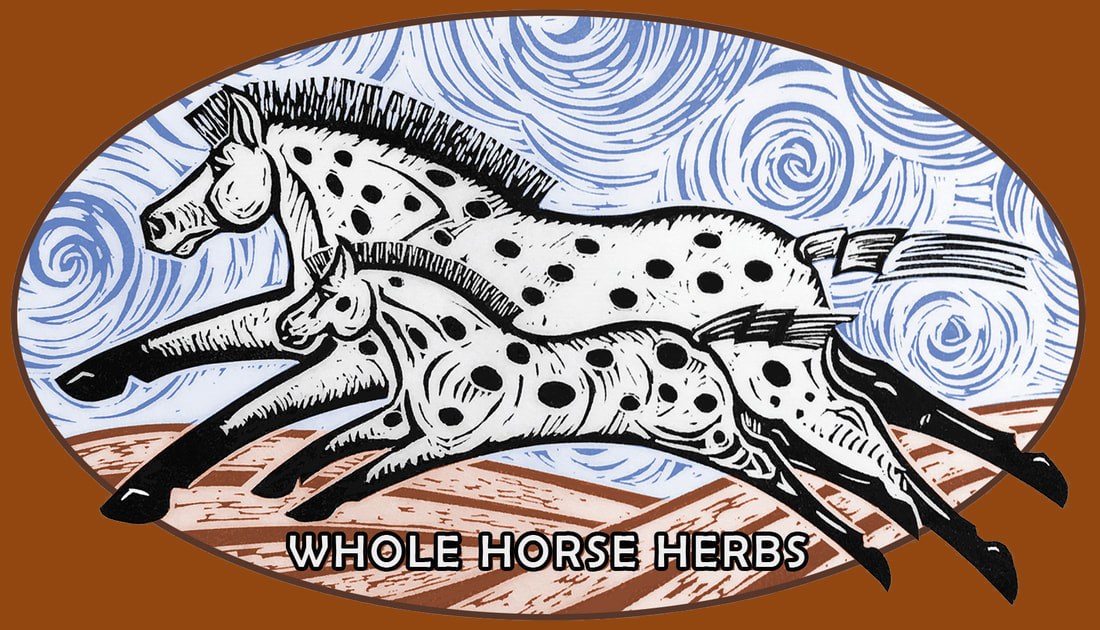Equine Loss Support
Loss of a Pasture Mate
 The dynamic duo - they hate to be separated
The dynamic duo - they hate to be separated
By Gloria Garland L.Ac, Dipl. Ac. & CH.
At some point in time, all caretakers face the challenge of letting a close horse friend go. While horses usually face their own passing with grace and dignity, it is those left behind, both human and horse, who seem to suffer the most. Acupressure can help with a horse's adjusting to life with out a friend.
Both humans and horses mourn the loss of an equine friend. While a period of mourning is natural and expected, prolonged grief and sadness becomes pathogenic and detrimental to the body. Horses can become listless, go off-feed, get depressed or become anxious after the loss of a close friend.
From the TCM perspective, grief is associated with the lung/metal element. Prolonged mourning not only leads to deficient lung function but weakens the immune system, or wei qi, as well. It is said that prolonged sadness depletes the body's qi, especially the heart qi, resulting in fatigue and listlessness. The Neijing, one of the classic books of Traditional Chinese Medicine, states"Treat the spirit first, and when the Shen (emotions) is serene, all pain is negligible."
The following acupressure points can help keep the emotions calm and the body strong during a difficult period of transition. These are effective for both horses and humans.
HT8 -excess emotional situations
LU5 -grief and sadness with underlying fear component
LU6 -acute grief and sadness
LU 9 -panic and separation anxiety
LIV6 -excess emotional situations
Yin Tong - calms the spirit and eases separation
Additionally, Rescue Remedy and the Chinese herb Suan zao ren (zizyphus), ½ to 1 tablespoon of powdered herb, can be used as needed during transition.
A veterinarian friend also recommends the following: If possible allow stable mates and pasture friends the opportunity to examine the body and say good-bye. Horses will nuzzle, lick, paw and even talk to the body. Allow them plenty of time. Their behavior may seem odd and upsetting to us, but in a short time they seem to understand that their friend won’t be getting up to join them. As difficult as this may be for owners to witness, it is much kinder than an abrupt separation for our horses.
And for the human caretakers, the following thoughts from Gail Ivey, an insightful horse woman and trainer, have comforted many following the loss of an equine friend:
"A horse is an amazing expression of life. Death never seems to interfere with that very much. It's a gift to let them go when their physical ability to express life becomes a burden to them." Gail Ivey, 2006
At some point in time, all caretakers face the challenge of letting a close horse friend go. While horses usually face their own passing with grace and dignity, it is those left behind, both human and horse, who seem to suffer the most. Acupressure can help with a horse's adjusting to life with out a friend.
Both humans and horses mourn the loss of an equine friend. While a period of mourning is natural and expected, prolonged grief and sadness becomes pathogenic and detrimental to the body. Horses can become listless, go off-feed, get depressed or become anxious after the loss of a close friend.
From the TCM perspective, grief is associated with the lung/metal element. Prolonged mourning not only leads to deficient lung function but weakens the immune system, or wei qi, as well. It is said that prolonged sadness depletes the body's qi, especially the heart qi, resulting in fatigue and listlessness. The Neijing, one of the classic books of Traditional Chinese Medicine, states"Treat the spirit first, and when the Shen (emotions) is serene, all pain is negligible."
The following acupressure points can help keep the emotions calm and the body strong during a difficult period of transition. These are effective for both horses and humans.
HT8 -excess emotional situations
LU5 -grief and sadness with underlying fear component
LU6 -acute grief and sadness
LU 9 -panic and separation anxiety
LIV6 -excess emotional situations
Yin Tong - calms the spirit and eases separation
Additionally, Rescue Remedy and the Chinese herb Suan zao ren (zizyphus), ½ to 1 tablespoon of powdered herb, can be used as needed during transition.
A veterinarian friend also recommends the following: If possible allow stable mates and pasture friends the opportunity to examine the body and say good-bye. Horses will nuzzle, lick, paw and even talk to the body. Allow them plenty of time. Their behavior may seem odd and upsetting to us, but in a short time they seem to understand that their friend won’t be getting up to join them. As difficult as this may be for owners to witness, it is much kinder than an abrupt separation for our horses.
And for the human caretakers, the following thoughts from Gail Ivey, an insightful horse woman and trainer, have comforted many following the loss of an equine friend:
"A horse is an amazing expression of life. Death never seems to interfere with that very much. It's a gift to let them go when their physical ability to express life becomes a burden to them." Gail Ivey, 2006


